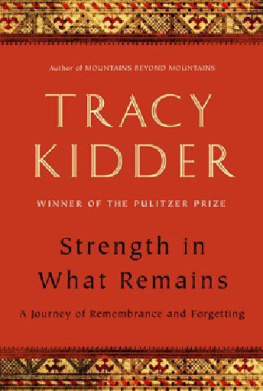This edition is published by BORODINO BOOKS www.pp-publishing.com
To join our mailing list for new titles or for issues with our books borodinobooks@gmail.com
Or on Facebook
Text originally published in 1934 under the same title.
Borodino Books 2017, all rights reserved. No part of this publication may be reproduced, stored in a retrieval system or transmitted by any means, electrical, mechanical or otherwise without the written permission of the copyright holder.
Publishers Note
Although in most cases we have retained the Authors original spelling and grammar to authentically reproduce the work of the Author and the original intent of such material, some additional notes and clarifications have been added for the modern readers benefit.
We have also made every effort to include all maps and illustrations of the original edition the limitations of formatting do not allow of including larger maps, we will upload as many of these maps as possible.
A COWMANS WIFE
BY
MARY KIDDER RAK
CHAPTER ITHE HOME RANCH
TODAY, far up on a sunny mountain-side, we found our horses which have been grazing where they pleased all summer. We brought them home and have selected new mounts to replace those that have been working for weeks past. From the blacksmiths shop comes the clink-clanking of hammer on iron as my husband shoes horse after horse. Occasionally he shouts for me to come and hold some skittish pony while it is being shod. Usually these are young horses that have not yet grown accustomed to having their feet picked up and hammered upon. Eagle, old enough to know better, must always be held. He is a beautiful, white, Mexican pony, a good, all-around cow-horse, who allows no one but his master to ride him. When Charlie is not at home, I have to feed Eagle, and for that reason he is quite willing to stand still while being shod if I am beside him with my arm around his neck.
In this rocky country, when we buy a new horse and want to locate it on our range, we take off its shoes, whereupon it speedily becomes tender-footed and loses all desire to roam afar. An hour ago, Robles, my gay young shepherd dog, dashed out of the door with one of my precious new riding-boots dangling from his mouth and was out of sight in a moment. With all the trees, rocks, and bushes about this house behind which a boot could be hidden, I feared that I should be barefooted and located like any broncho. When I had given up the search, expecting never to see my boot again, in frolicked the dog and laid it at my feet with a joyous tail-wag.
When I am not holding horses nor cooking dinner, I am trying to make this little cottage look like a home. I dare not let myself think of our lost possessions nor of our big house, so recently destroyed by fire. When I pass its ruins, as I must several times a day, I avert my eyes, lest I lie awake at night or live through the fire again in my dreams. Little by little, we are again providing ourselves with the necessities of life and are appalled to find out how many of them there are. We are livingit is more like campingin the little five-room cottage which cowboys formerly used. We have a much better house on the ranch, but it is a mile from the barns and corrals and we and the cows must stick together. Our burned home was Old Fort Rucker, built massively of thick adobe bricks during the days when Geronimo and his Chiricahua Apaches lived and fought in these mountains. The fort was once the principal building of a cavalry post and served both as a place of defense and a commissary. In wagons drawn by four horses, supplies were hauled fifty-six miles from Wilcox, the nearest railroad town.
Long before we came here, the fort had been converted into a rambling, up-and-down dwelling. Our women visitors from town used to patter around the vast rooms and down the steep stairs to the dark, basement kitchen, murmuring, How perfectly romantic! One bright side to our present situation is the comparative convenience of the tiny house we now live ina house so small that Charlie says, You cant curse the cat without getting fur in your mouth. An adobe wall has been built to enclose this old frame house and make it warmer. A shining, new, iron roof of many angles has been cut and contrived to cover the old, sundried shakes which would burn like tinder if a spark fell on them. So much for the outside of the house. The inside is for me to deal with as I find time, paint, and gumption. For the past month we have been cooking out-of-doors on a campfire in the back yard. It wasnt so bad at first, but when white frost covered the grass each morning, ice tinkled in the water bucket and Robles snuggled to the warm rocks of the campfire, we thought of the ancient monster of a range that stood in the kitchen of an unused adobe house on our upper ranch. It was brought down a few days ago and we are gratefully eating breakfast in a warm room.
Yesterday we went to town to buy what we could of a list as long as my arm. It was not a pleasure trip, for this is what going to town in cold weather involves when one lives, as we do, far up in the Chiricahua Mountains, in the southeast corner of Arizona, at the back of Beyond. We get up at four oclock, cook and eat breakfast and do the indispensable chores of milking and feeding horses and chickens. Kettles of water are heated to warm the cockles of the trucks heart. A hind wheel is jacked up; motor oil is drained and warmed on the back of the stove until the whole house reeks like an engine room at sea. While I dress in my town-going garments, Charlie pours boiling water into the radiator and warm oil into the crank-case. Then he cranks, cranks, cranks! The motor finally snorts Chuff! just once. More cranking; two chuffs, a few coughsthen it really sings Chooka-chooka-chooka! with welcome clamor. I dash out to sit in the car with my finger on the gas throttle, warming up the motor. Charlie lowers the hind wheel to the ground; then goes inside to warm his half-frozen hands, put on a necktie and his best shoes. We are on our way.
Ours is the ranch nearest the high peaks of the Chiricahuas. To reach it one must follow the windings of a long canyon, cliffs opening fold on fold as the rough road ever ascends. The river, which winds with the road and must often be forded, is a torrent, a brawling stream, a trickle or a dry waste of boulders, according to the time of year, the rainfall, or the melting of snows on the pineclad peaks which are its source. As one climbs up the canyon road, the gorge grows ever narrower, the road and river sharing the small space between abruptly rising mountains. Suddenly, as one emerges from a narrow, shadowy pass, the sun pours down upon the far reaches of a gigantic basin, enclosed by a ring of lofty peaks. Canyon after canyon falls away from these heights, each with a stream that unites with our river and replenishes it. This great, circular basin, with its wooded canyons, sunny ridges and pineclad slopes, contains the twenty-two thousand acres of grazing land which form Old Camp Rucker Ranch. It is one of the oldest ranches in our part of the country, established while hostile Indians still made an occasional raid. The brand on our cattle is









